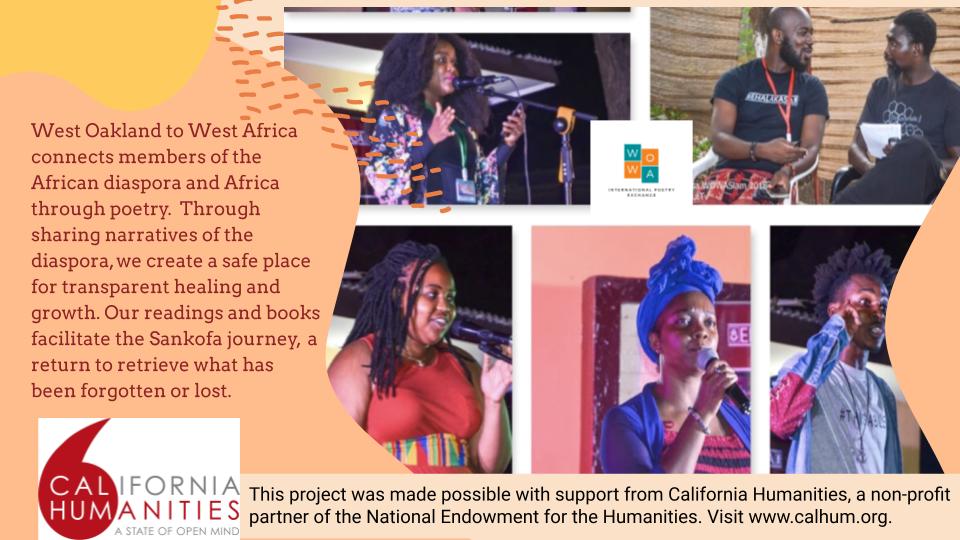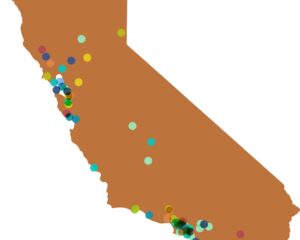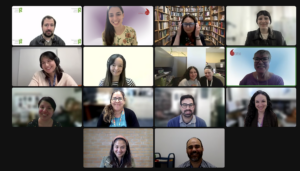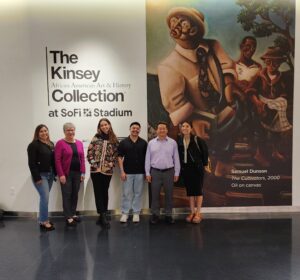“West Oakland to West Africa International Poetry Exchange Book Forums (WO2WA)” is a project supported by a Humanities for All Quick grant that amplifies poetic works through an exchange between a community of primarily Black writers living in Oakland, and poets and artists in Nigeria and Kenya. During the COVID-19 pandemic, twenty-four Oakland poets exchanged epistolary poems with twenty-four West African poets resulting in an anthology that will be distributed for free. To gain a deeper perspective of the project, we asked Project Director Karla Brundage to share some details.
- What was the inspiration behind creating this project, and how did the partnership between both groups of poets begin?
Since the original exchange over six years ago, West Oakland to West Africa (WO2WA) has done four poetry exchanges–two with a group called CIA Lagos in Nigeria, one in Ghana, and our current exchange with Kisii University in Kisii, Kenya. The current exchange, which was supported by a Humanities for All Quick Grant, includes 56 poets from Oakland, Kenya, and Nigeria. CIA Lagos is directed by Koku Konu who, after hearing about our program, reached out to me and invited us to participate in an exchange based on the poetry of Christopher Okigo, a famous Nigerian poet. Through this collaboration as well as through poet Rashidah Ismaili of Harlem’s Salon d’Afrique, I was introduced to Christopher Okemwa, of Kisii University, and editor of the international poetry anthology, I Can’t Breathe. He reached out to me after seeing our website and inquired about how he could get involved. He said, “How about EO2EA (East Oakland to East Africa). I loved this idea as I live in East Oakland and reached out to poet Tongo Eisen-Martin who reached out to DonJuan Carter-Woodward of Eastside Arts Alliance and the Patrice Lumumba Writing Collective. Dr. Okemwa gathered several students, and we began an exchange with the hopes of attending the Kistrech International Poetry Festival. The rest, as they say, will soon be history.
- Your project draws from the Renshi poetry tradition. Can you tell us more about this style of writing and how it influenced this project?
The key to this exchange is the curriculum and the format. During the incubation process of this project, I had envisioned a program that aligned closely with Youth Speaks. I had hoped to create a version of the Brave New Voices poetry slam in Africa. However, when I got to Mills College my professors asked me, “Do you really think you can do this?” There is something inside of me that loves a challenge, and while I doubted that I could logistically host a poetry slam festival in Ghana, I did not want to give up on the idea of an artist exchange. It was in a lucid moment one night when my ancestors spoke to me.
For ten years, I had been exchanging poetry using a format called Renshi, shared with me by my heart-friend, Allison Francis, in Hawaii, where I grew up. Renshi is an epistolary poetic form in which a pair of writers, usually close friends, exchanges poetry in letter form using the last line of their partner’s poem to begin their own. It was at this moment that I saw how the project could come to life despite the obstacles of distance and time. The Renshi form (which translated means linked or chained together) became the foundation of the exchanges. In each exchange I match pairs of poets who write for several weeks on different themes, engaging in workshops, and using the Renshi form to ensure connection. The result was mind blowing. Authentic connections were formed, and the chain caused a reaction of growth and cultural healing between partners. It is a simple form, but poetry is a catalyst for the journal back to our past and into the future. It is an Afro-Futuristic time machine in which our participants can share stories which in turn allow for us to heal within the African Diaspora. In the end, we did travel to Ghana, and we did have a poetry slam and festival. It was an amazing experience, especially since this all happened before the COVID-19 shutdowns. The next year, 2019, was declared the “Year of Return,” by Ghana’s president Nana Akufo-Addo, and a great repatriation began.
- In addition to presenting virtual poetry readings, and workshops, the poets in this exchange collaborated on a book entitled, Our Spirits Carry Our Voices (Pacific Raven Press). Can you tell us more about what the concept of Sankofa means for this project?
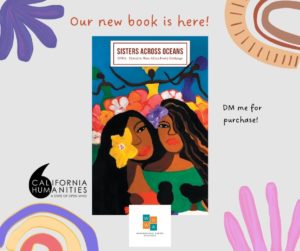 Sankofa is an Akan Twi word that means “to retrieve,” but the meaning of Sankofa is more broadly expanded upon in this Akan proverb: “Se wo were fi na wosankofa a yenkyi” (translated from the Akan language to mean “it is not taboo to go back and fetch what you forgot”). This word came into my consciousness when I saw the 1993 film Sankofa, directed by Haile Gerima which centered on the Atlantic slave trade. The impact of this film cannot be understated, and the guiding symbol was a Sankofa bird that flew from the slave ship, symbolizing a return to Africa, to learn its true heritage and rich history. After we published our first book, Our Spirits Carry Our Voices, we traveled to Ghana where we participated in a poetry slam with Ehalakasa and our partners. We also went to the Cape Coast and Elmina where we visited the slave dungeons, and this was a powerful moment for all of us. The power of that Sankofa moment, that return to our ancestors, forever changed us. The book is distributed for free to our 54 participants. We sell the book to other interested parties. Fifty percent of book sales support future projects and fifty percent supports our partner organizations in Ghana, Kenya and Nigeria.
Sankofa is an Akan Twi word that means “to retrieve,” but the meaning of Sankofa is more broadly expanded upon in this Akan proverb: “Se wo were fi na wosankofa a yenkyi” (translated from the Akan language to mean “it is not taboo to go back and fetch what you forgot”). This word came into my consciousness when I saw the 1993 film Sankofa, directed by Haile Gerima which centered on the Atlantic slave trade. The impact of this film cannot be understated, and the guiding symbol was a Sankofa bird that flew from the slave ship, symbolizing a return to Africa, to learn its true heritage and rich history. After we published our first book, Our Spirits Carry Our Voices, we traveled to Ghana where we participated in a poetry slam with Ehalakasa and our partners. We also went to the Cape Coast and Elmina where we visited the slave dungeons, and this was a powerful moment for all of us. The power of that Sankofa moment, that return to our ancestors, forever changed us. The book is distributed for free to our 54 participants. We sell the book to other interested parties. Fifty percent of book sales support future projects and fifty percent supports our partner organizations in Ghana, Kenya and Nigeria.
- How can we learn more about upcoming W2W events, or other poetry exchanges in progress?
You can follow us on our social media platforms, visit the WO2WA website, or my website to learn more about our upcoming projects and events.
IG: westoakland_westafrica
Twitter: WOakland2Africa
Facebook: https://www.facebook.com/WO2WA
Below is one of the poems created through the W2W project:
How Do You Read Water?
The 78th Psalmist
Odiase David Osaodion, known as The 78th Psalmist, is a Nigerian poet and spoken word artist, born in Surulere, Lagos. Famed for his command of wordplay, metaphors, and sarcasm, his writings are considered non-conformist, yet conscientious. His work has been described as “A light pen scribbling dark truths.”
When historians ask me to fetch my ancestors,
I serve them the ocean in a bowl.
Watch its viscous content sway, like the angst of a slave coffle,
Dangle my grip loosely & just enough to hear the water whisper:
Hold me gently, careful not to spill the truth of my becoming,
Hold me gently, my rippling is a language fighting not to drown.,
Ghost stories of Chattel-thirsty vessels, some as long as a sigh,
Dragging themselves to the haggard shore,
A Jonah too salty to be swallowed.
This is how we read water.
This is how we read water,
How we speak a language by being bubble-headed,
holding our breath and sinking.
For what is water, if not a prisoner?
Gas molecules bound by the despondence of chemistry.
Aren’t the tides, the water’s way of staging an uprising?
Like the bound people at Ebo Landing,
There are prepositions of mass suicides docked between these sentences.
A worn out friction between ocean and wood.
How do you read water?

